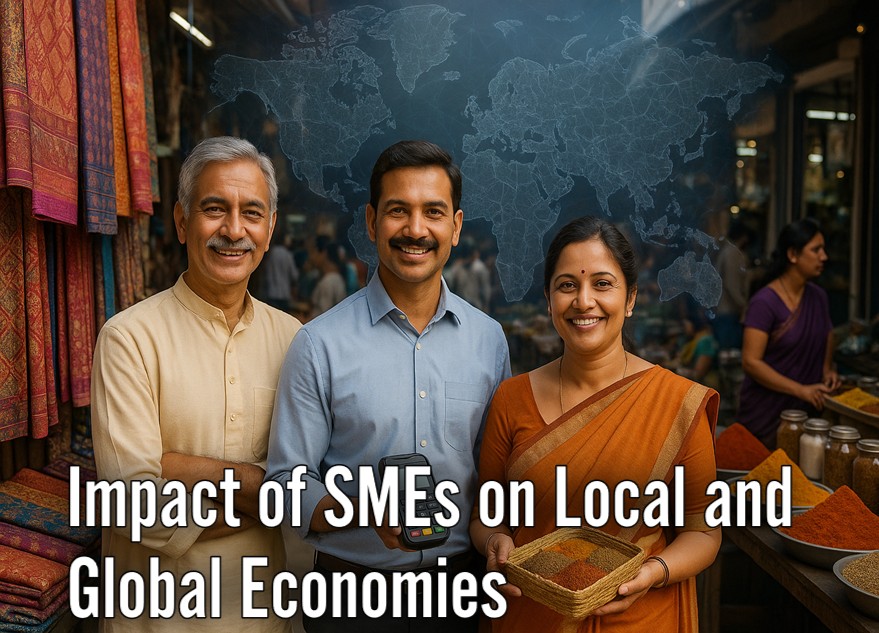Small and Medium Enterprises (SMEs) are often referred to as the backbone of economies, and for good reason. Their impact extends far beyond their size, playing a pivotal role in driving economic growth, innovation, and employment at both local and global levels. In many regions, SMEs contribute significantly to GDP, providing a diverse range of goods and services that cater to the unique needs of local communities. This post aims to give you a closer look at how SMEs contribute to the economy, so read on!
💡 Are you looking for Coworking space in Gurgaon, Noida or Delhi? We are just a call away.
Call Now: 08999 828282
10 Best Impact of SMEs on Local and Global Economies
- Job Creation
- Economic Growth
- Innovation and Creativity
- Regional Development
- Supply Chain Support
- Export Contributions
- Community Support
- Flexibility and Resilience
- Entrepreneurial Culture
- Contribution to Global Economy

1. Job Creation
SMEs are a major source of employment, providing jobs for millions of people worldwide. In many countries, SMEs employ more than half of the workforce, reducing unemployment rates and supporting families.
2. Economic Growth
SMEs contribute to the GDP of a country by producing goods and services. Their activities lead to increased production, which in turn boosts economic growth. This is especially true in developing countries, where SMEs often drive local economies.
3. Innovation and Creativity
Many SMEs are at the forefront of innovation. They bring new products and services to the market, often responding quickly to changing consumer needs. This innovation drives competition and leads to better products and services.
Also Read: The Role of Microfinance in Empowering SMEs
4. Regional Development
SMEs are often spread across various regions, including rural and less-developed areas. By setting up businesses in these regions, SMEs contribute to regional development, reducing the economic gap between urban and rural areas.
5. Supply Chain Support
SMEs are integral parts of larger supply chains, providing essential goods and services to bigger companies. This interdependence strengthens the overall economy and ensures the smooth functioning of various industries.
6. Export Contributions
Many SMEs are involved in exporting goods and services to other countries. This not only helps them grow but also contributes to the national economy by bringing in foreign exchange.
7. Community Support
SMEs often have strong ties to their local communities. They support local events, hire locally, and invest in community projects. This strengthens community bonds and promotes social cohesion.
8. Flexibility and Resilience
SMEs are known for their ability to adapt quickly to changes in the market. Their flexibility allows them to survive economic downturns and continue operating when larger companies might struggle.
💡 SMBs looking for HR, Marketing, Technology and Funding solutions for their business.
Call Hello Jarvis 994 8000 800
9. Entrepreneurial Culture
SMEs foster an entrepreneurial culture by encouraging people to start their own businesses. This culture of entrepreneurship leads to more business creation, further driving economic growth.
10. Contribution to Global Economy
On a global scale, SMEs contribute to international trade and economic interconnectivity. By participating in global markets, SMEs help spread economic benefits across countries, fostering international cooperation and economic stability.
To sum up, SMEs are vital to both local and global economies. Their contributions go beyond just economic numbers; they impact communities, drive innovation, and create opportunities for millions of people around the world. By supporting SMEs, we support the backbone of the economy. Set your office at The Office Pass (TOP) co-working spaces available in Delhi and NCR. TOP offers all the facilities required by SMEs to run a successful business all under one roof at cost-effective pricing. Contact us for more details at 08999 828282.
FREQUENTLY ASKED QUESTIONS (FAQS):
Question: What is an SME?
Answer: An SME, or Small and Medium Enterprise, refers to businesses with a limited number of employees and turnover. These companies play a crucial role in the economy by driving innovation, creating jobs, and contributing to GDP.
Question: How do SMEs impact the local economy?
Answer: SMEs impact the local economy by generating employment, fostering community development, and contributing to local supply chains. Their presence boosts economic diversity and resilience, making communities less dependent on large corporations.
Question: What is the impact of SMEs on the global economy?
Answer: SMEs contribute to the global economy by participating in international trade, driving innovation, and influencing global supply chains. Their agility and adaptability allow them to respond to global market demands, fostering economic growth worldwide.
Question: How do SMEs impact innovation in the economy?
Answer: SMEs drive innovation by developing new products, services, and business models. Their flexibility and willingness to take risks make them key players in introducing new ideas that can transform industries and economies.
Question: Why is the impact of SMEs on the economy important?
Answer: The impact of SMEs on the economy is important because they are a major source of employment and innovation. Their ability to adapt quickly to market changes ensures economic stability and growth, making them vital to both local and global economies.
Question: What challenges do SMEs face that affect their impact on the economy?
Answer: SMEs often face challenges such as limited access to finance, regulatory hurdles, and competition from larger firms. These obstacles can limit their ability to grow and fully realize their potential impact on the economy.
Question: How can governments support the impact of SMEs on the economy?
Answer: Governments can support the impact of SMEs by providing access to finance, reducing regulatory burdens, and offering incentives for innovation. Supportive policies can help SMEs thrive, enhancing their contribution to the economy.
Question: What is the long-term impact of SMEs on the economy?
Answer: The long-term impact of SMEs on the economy includes sustained job creation, continuous innovation, and the promotion of economic resilience. Their ability to adapt and grow ensures they remain a crucial part of both local and global economic landscapes.



